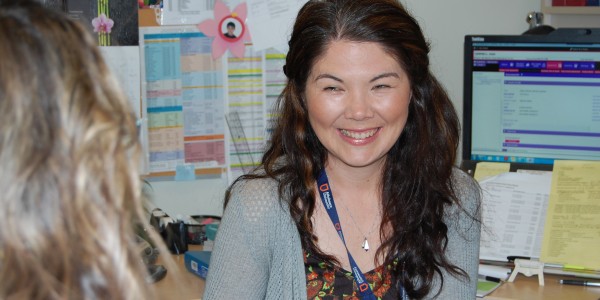Dementia…not just a seniors’ disease
When you picture a person with dementia, who do you see? Is that person older or younger? What many people don’t realize is that people at a younger age can, in fact, develop dementia.
It’s an area of research upon which VCH Richmond Community Health Nurse Mariko Sakamoto focused her master’s thesis (nursing) for graduation from Athabasca University. Entitled Perceptions of personhood and the early onset dementia experience: I’m still here, the study won the 2015 MA dissertation award from the International Institute for Qualitative Methodology, located at the University of Alberta.
Sakamoto’s thesis examined the experience of early-onset dementia in younger patients. She presented her findings in Glasgow, Scotland this past May, at the international Qualitative Methods Conference. It’s a topic area about which little has been published. Sakamoto’s thesis can be accessed here.
“Being a younger person with this illness is especially devastating,” Sakamoto said. “It’s always devastating because it’s a disease that takes so much away. But when you’re a younger person, it’s just that much more difficult. The stigma for dementia is hard at any age, but is particularly hard for younger people.”
A person-centred research lens
For her research, Sakamoto took an intimate approach and interviewed four dementia patients themselves; something some said couldn’t be done.
“Patients told me it was hard to explain to others that they had dementia because nobody could understand it,” she said. “They would get comments like, ‘You look too young to have dementia’ or ‘You don’t look like a person with dementia.’ People have these perceptions of what a dementia patient looks like, and a younger person doesn’t fit that…I learned a lot from them.”
Sakamoto, who is starting her PhD in Nursing at UBC in the fall, said her passion for learning more about the impact of dementia stems from two personal experiences. Her grandmother had Alzheimer’s, and Sakamoto once worked with a 50 year old man who had been diagnosed with the disease. “There weren’t a lot of resources for this man and that experience motivated me to explore it further,” she said.
Sakamoto is looking forward to the next chapter in her academic career, and sees more teaching and research in her future. “But I’ll always see myself as a nurse first,” she said. “Even if I’m not always at the bed side.”


Bronwen
Congratulations Mariko. What an accomplishment! Your thesis looks great, I look forward to reading the rest soon.
Devinder
So proud of you Mariko! Congratulations!
Cheryl Chan
Congratulations Mariko! We need people like you to find the person inside for people living with Dementia.
ileana
great work and so timely as well looking forward to more…..
Lillian Hung
Congratulations, Mariko.
Dennis
Dear Nellie,
What really contributes to dementia in younger people?
Too much computer games? Stress? Or too much reliance on cell phones?
Too much unhealthy brain activities? What mental games (board games) should one be involved in order to prevent dementia in the longrun?
I hope Nurse Sakamoto can provide some explanations on her findings related to dementia. Thanks.
Kirk
I think playing games like chess will certainly help in preventing or delaying the [early] onset of dementia. Any mind game involving the use of memory are good to play. I presume doing this will help to strengthen the synaptic connections within the brain
https://en.chessbase.com/post/checkmating-alzheimers-disease-210513
Brenda
Congrats Mariko Well Done. Enjoy learning, inspiring and leading others to think outside the box.
Mariko
Hello Dennis
Thank you very much for your comment and questions.
My work was not focused specifically on the causes of early onset dementia – rather the lived experience of being a younger person with this disease – with the purpose of trying to gain a better understanding of this phenomenon. My hope as a nurse was that if we can achieve insight into this lived experience – we might then be able to consider how we can better support younger people living with an illness more commonly experienced later in life.
However, there is information on the Alzheimer’s website about early onset dementia: http://www.alzheimer.ca/en/About-dementia/Dementias/young-onset-dementia
Best regards,
Mariko